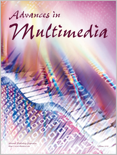
Advances in Multimedia
Scope & Guideline
Connecting Scholars to the Multimedia Revolution
Introduction
Aims and Scopes
- Multimedia Processing Techniques:
Research on advanced algorithms and methodologies for processing multimedia data, including image, audio, and video processing. This encompasses areas such as image enhancement, compression, and real-time processing. - Artificial Intelligence and Machine Learning in Multimedia:
Exploration of how AI and machine learning technologies can be applied to improve multimedia systems, including applications in image recognition, natural language processing, and intelligent recommendation systems. - Educational Multimedia Applications:
Development and analysis of multimedia tools and strategies for enhancing educational practices, particularly in language learning, music education, and interactive teaching methodologies. - Big Data and Multimedia Fusion:
Investigations into the integration of big data analytics with multimedia technologies to enhance data-driven decision-making in various sectors, including education, healthcare, and logistics. - Network and Security in Multimedia Systems:
Studies focused on the security and privacy aspects of multimedia systems, including encryption techniques and secure data transmission methods. - Multimedia in Smart Environments:
Research on the application of multimedia technologies in smart cities, IoT environments, and other innovative frameworks that leverage multimedia for enhanced user interaction and experience.
Trending and Emerging
- Generative Adversarial Networks (GANs) and Deep Learning:
The application of GANs and deep learning techniques is on the rise, particularly in areas such as image synthesis, enhancement, and creative content generation, demonstrating their potential in multimedia innovations. - Multimodal Data Analysis and Integration:
Research focusing on the integration of various data modalities (text, image, audio, etc.) is gaining traction, emphasizing the need for comprehensive systems that can analyze and interpret complex data sets. - Real-Time Multimedia Processing:
With advancements in technology, there is an increasing focus on real-time processing capabilities in multimedia applications, particularly for video streaming, surveillance, and interactive systems. - Augmented Reality (AR) and Virtual Reality (VR) Applications:
The use of AR and VR technologies in education and training is emerging as a significant area of research, highlighting their effectiveness in creating immersive learning experiences. - Privacy and Security in Multimedia Systems:
As concerns over data privacy grow, research into secure multimedia systems, including encryption and secure data sharing, is becoming increasingly relevant and necessary.
Declining or Waning
- Traditional Multimedia Teaching Methods:
There has been a noticeable decline in research focused solely on traditional multimedia teaching methods, as the field shifts towards more innovative, technology-driven approaches that leverage AI and interactive technologies. - Static Multimedia Content Analysis:
Research that emphasizes static analysis of multimedia content without interactive or dynamic components is waning, as the focus moves towards dynamic, real-time applications and user engagement. - Basic Data Processing Techniques:
Fundamental techniques for multimedia data processing are becoming less common as the field evolves towards more complex, integrated solutions that incorporate machine learning and AI methodologies. - Low-Level Image Processing:
As advancements in high-level processing techniques emerge, interest in low-level image processing methods has decreased, with researchers focusing more on applications that utilize advanced algorithms and AI. - Traditional Multimedia Archiving Techniques:
The exploration of conventional multimedia archiving techniques is declining, overshadowed by the growing significance of big data analytics and cloud-based storage solutions.
Similar Journals

Porta Linguarum
Connecting theory and practice in language education.Porta Linguarum, published by UNIV GRANADA in Spain, is a pioneering journal dedicated to the fields of linguistics and language studies, with a dual focus on the educational implications and applications within these disciplines. Launched in 2008 and continuing its impactful contributions into 2024, the journal is recognized for its rigorous peer-reviewed articles that address contemporary language issues, pedagogical approaches, and linguistic research, evidenced by its notable rankings in the 2023 Scopus metrics. Porta Linguarum holds a distinguished Q1 classification in Linguistics and Language, alongside a respectable Q3 placement in Education, marking it as a valuable resource for academics and practitioners alike. With an impressive ranking of 231 out of 1088 in the Arts and Humanities category and a strong 78th percentile ranking for Language and Linguistics, this journal facilitates the exchange of innovative ideas and promotes scholarly discourse. Although currently not adopting an open access model, it remains an essential platform for advancing knowledge in linguistics and education.

Journal of Technology and Chinese Language Teaching
Bridging Technology and Language EducationJournal of Technology and Chinese Language Teaching, published by JOURNAL TECHNOLOGY & CHINESE LANGUAGE TEACHING, serves as an influential platform for scholars and practitioners in the intersecting fields of technology, language education, and linguistic research. With an ISSN of 1949-260X, this journal strives to disseminate cutting-edge research and innovative practices aimed at enhancing the teaching and learning of Chinese language through technological advancements. Operated from the United States, it currently occupies valuable quartiles within its categories, showcasing its significance—ranking Q4 in Computer Science Applications, Q3 in Education, and Q2 in Linguistics and Language. As it spans from 2019 to 2024, the journal provides a rich repository for international contributions, fostering a collaborative environment for educators, researchers, and students alike. With both Scopus and HIndex metrics reflecting a solid reputation, the Journal of Technology and Chinese Language Teaching is pivotal for those keen on pushing the boundaries of language instruction in the digital age.

International Journal of Education and Information Technologies
Fostering Research that Transforms Learning EnvironmentsWelcome to the International Journal of Education and Information Technologies, a leading academic platform published by NORTH ATLANTIC UNIV UNION-NAUN. With an emphasis on the integration of education and information technology, this journal aims to foster innovative research and discussions that enhance pedagogical practices and technological advancements in educational contexts. Although currently an open access journal, it provides unrestricted access to emerging studies that are crucial for educators, researchers, and professionals aiming to stay at the forefront of education technology. While specific metrics such as H-index and Scopus ranks are yet to be defined, its ISSN 2074-1316 signifies its credibility and commitment to quality scholarship. This journal serves as a vital resource for those passionate about bridging the gap between technology and education, encouraging impactful research that shapes the future of learning environments.
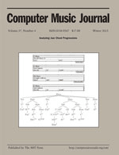
COMPUTER MUSIC JOURNAL
Pioneering Research in the World of Computer MusicComputer Music Journal, published by MIT Press, stands as a prominent platform for scholarly discourse in the intersection of music and technology. With its origins dating back to 1982, the journal spans an extensive range of topics, from computer-generated music and sound synthesis to interactive musical systems and multimedia art. Despite not being an open-access journal, it has garnered significant recognition, reflected in its rankings across various fields—placing 22nd in Music within Arts and Humanities and achieving a Q2 category status in Music for 2023. This publication is invaluable for researchers, practitioners, and enthusiasts alike, offering critical insights that expand the boundaries of musical composition and technological innovation. With its robust history and commitment to advancing the understanding of computer music, the Computer Music Journal continues to be a critical resource in both the academic and artistic communities.
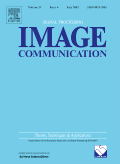
SIGNAL PROCESSING-IMAGE COMMUNICATION
Elevating Standards in Image Communication ResearchSIGNAL PROCESSING-IMAGE COMMUNICATION, published by Elsevier, is a leading journal in the fields of Computer Vision, Signal Processing, and Electrical Engineering. With an impressive range of Quartile rankings in 2023, including Q1 in Electrical and Electronic Engineering and Q2 in Signal Processing, this journal is vital for researchers and professionals seeking the latest advancements and comprehensive studies in image communication technologies. Issued in the Netherlands, SIGNAL PROCESSING-IMAGE COMMUNICATION has been an essential resource since its inception in 1989, fostering innovation and collaboration among academia and industry. The journal provides a platform for high-quality peer-reviewed research, addressing significant challenges and solutions in the convergence of image processing and communication. Although currently not an Open Access journal, it offers subscription options that ensure a broad dissemination of groundbreaking knowledge. With a robust reputation reflected in its Scopus ranks, this journal serves as an indispensable reference for students and experts aiming to stay at the forefront of developments in this dynamic field.
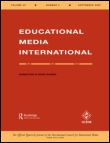
Educational Media International
Connecting theory and practice in educational media.Educational Media International, published by Routledge Journals, Taylor & Francis Ltd, is a premier journal in the interdisciplinary fields of Communication and Education, with a commendable Q2 ranking in both categories as of 2023. Established in 1978, this journal serves as a significant platform for the dissemination of innovative research that explores the evolving intersection of media technologies and educational practices. With an emphasis on both theoretical and practical applications, it addresses crucial topics such as digital learning environments, multimedia educational resources, and the impact of social media on education, making it an essential resource for researchers, professionals, and students alike. Located in the United Kingdom, Educational Media International not only contributes to the academic discourse but also reflects global trends and challenges in education, fostering a deeper understanding of the vital role media plays in shaping learning experiences worldwide.

Culture and Education
Transforming Educational Landscapes Through Cultural InsightsCulture and Education is an esteemed journal published by SAGE Publications Inc, focusing on the interdisciplinary nexus between cultural studies and education. With an impactful presence in the academic community, the journal holds significant rankings, placing in the Q1 category for Cultural Studies and Q3 for Education as of 2023. This positions it within the top 14% of journals in Cultural Studies, and it ranks 174 out of 1304 in its category according to Scopus. The journal serves as a vital platform for researchers, professionals, and students dedicated to exploring how cultural dynamics shape educational experiences and policies. Its publications not only contribute to theoretical discussions but also inform practice and policy-making within educational settings. Although it operates under a traditional access model, the journal's commitment to sharing valuable insights into contemporary cultural and educational issues underscores its importance in fostering scholarly discourse. For those engaged in the evolving fields of cultural studies and education, Culture and Education is essential reading, reflecting the latest research and trends from 2008 to 2024.

International Arab Journal of Information Technology
Fostering Innovation Across Arab Tech LandscapesWelcome to the International Arab Journal of Information Technology, a prestigious publication under the aegis of ZARKA PRIVATE UNIVERSITY in Jordan, dedicated to advancing the field of Information Technology. First established in 2008, this journal has made significant strides in disseminating high-quality research, achieving an impressive Q2 ranking in Computer Science (miscellaneous) and securing a notable 57th percentile position in the Scopus rankings. With a comprehensive scope encompassing various sub-disciplines of computer science, the journal is committed to promoting scholarly dialogue and innovation among researchers, professionals, and students. While currently operating as a subscription-only journal, it remains a vital resource for the academic community seeking to explore the latest trends and advancements in technology. The International Arab Journal of Information Technology is not only a platform for original research but also a vibrant hub for ideas that shape the technological landscape of the Arab region and beyond.
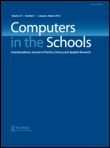
COMPUTERS IN THE SCHOOLS
Transforming classrooms with cutting-edge computer research.COMPUTERS IN THE SCHOOLS, published by ROUTLEDGE JOURNALS, TAYLOR & FRANCIS LTD, is a pivotal scholarly journal dedicated to exploring the intersection of technology and education. With an impressive publishing history dating back to 1984 and ongoing contributions until 2024, this journal provides a comprehensive platform for researchers and educators to disseminate innovative ideas and practices related to the use of computers in educational settings. Although the journal does not currently offer Open Access options, it maintains an esteemed position in the academic community, evidenced by its Q2 ranking across multiple categories including Computer Science, Education, and Library and Information Sciences in 2023. It is particularly valued for its rigorous peer-review process which ensures high-quality contributions. With its ISSN of 0738-0569, COMPUTERS IN THE SCHOOLS serves as an essential resource for advancing knowledge, fostering best practices, and influencing policy in the integration of technology into schools, making it indispensable for educators, researchers, and practitioners striving to enhance learning experiences through innovative technological approaches.

Applied Computing and Informatics
Exploring the Frontiers of Computer Science ApplicationsApplied Computing and Informatics, published by Emerald Group Publishing Ltd, is a prominent open-access journal that has been serving the academic community since 2011. With a focus on advancing the fields of Computer Science Applications, Information Systems, and Software, this journal has established itself as a noteworthy publication, currently ranking in the Q3 quartile for each of its categories in 2023. The journal is particularly recognized for its commitment to disseminating high-quality research, as evidenced by its impressive Scopus rankings—placing it in the 92nd percentile for Computer Science Applications and the 91st percentile for both Information Systems and Software. Based in Saudi Arabia, it adopts a global perspective, inviting contributions from researchers worldwide. With its open-access policy, Applied Computing and Informatics ensures that cutting-edge research is accessible to a broad audience, fostering collaboration and innovation within the computing and informatics disciplines. This journal is an essential resource for academics, professionals, and students seeking to keep abreast of the latest trends and developments in their field.